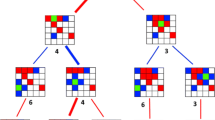Abstract
Generating good move orderings when searching for solutions to games can greatly increase the efficiency of game solving searches. This paper proposes a move generating algorithm for the board game called Hex, which in contrast to many other approaches, determines move orderings from knowledge gained during the search. This move generator has been used in Hex searches solving the 6x6 Hex board with comparative results indicating a significant improvement in performance. One anticipates this move generator will be advantageous in searches for complete solutions of Hex boards, equal to, and larger than, the 7x7 Hex board.
Preview
Unable to display preview. Download preview PDF.
Similar content being viewed by others
References
van Rijswijck, J.: Computer Hex: Are Bees Better than Fruitflies? Master of science, University of Alberta (2000)
Hayward, R., Björnsson, Y., Johanson, M., Kan, M., Po, N., Rijswijck, J.V.: Advances in Computer Games: Solving 7x7 HEX: Virtual Connections and Game-State Reduction. IFIP International Federation of Information Processing, vol. 263. Kluwer Achedemic Publishers, Boston (2003)
Hayward, R., Björnsson, Y., Johanson, M., Po, N., Rijswijck, J.v.: Solving 7x7 hex with domination, fill-in, and virtual connections. In: Theoretical Computer Science, Elsevier, Amsterdam (2005)
Reinefeld, A.: A minimax algorithm faster than alpha-beta. In: van den Herik, H., Herschberg, I., Uiterwijk, J. (eds.) Advances in Computer Chess, University of Limburg, vol. 7, pp. 237–250 (1994)
Müller, M.: Not like other games - why tree search in go is different. In: Fifth Joint Conference on Information Sciences, pp. 974–977 (2000)
Abramson, B.: Control strategies for two player games. ACM Computing Survey 21(2), 137–161 (1989)
van Rijswijck, J.: Search and Evaluation in Hex. Master of science, University of Alberta (2002)
Gardener, M.: The game of hex. In: The Scientific American Book of Mathematical Puzzles and Diversions, Simon and Schuster, New York (1959)
Anshelevich, V.V.: An automatic theorem proving approach to game programming. In: Proceedings of the Seventh National Conference of Artificial Intelligence, pp. 194–198. AAAI Press, Menlo Park (2000)
Anshelevich, V.V.: A hierarchical approach to computer hex. Artificial Intelligence 134, 101–120 (2002)
Yang, J., Liao, S., Pawlak, M.: On a Decomposition Method for Finding Winning Strategies in Hex game. Technical, University of Manitoba (2001)
Rasmussen, R., Maire, F.: An extension of the h-search algorithm for artificial hex players. In: Australian Conference on Artificial Intelligence, Springer, pp. 646–657 (2004)
Author information
Authors and Affiliations
Editor information
Editors and Affiliations
Rights and permissions
Copyright information
© 2006 Springer-Verlag Berlin Heidelberg
About this paper
Cite this paper
Rasmussen, R., Maire, F., Hayward, R. (2006). A Move Generating Algorithm for Hex Solvers. In: Sattar, A., Kang, Bh. (eds) AI 2006: Advances in Artificial Intelligence. AI 2006. Lecture Notes in Computer Science(), vol 4304. Springer, Berlin, Heidelberg. https://doi.org/10.1007/11941439_68
Download citation
DOI: https://doi.org/10.1007/11941439_68
Publisher Name: Springer, Berlin, Heidelberg
Print ISBN: 978-3-540-49787-5
Online ISBN: 978-3-540-49788-2
eBook Packages: Computer ScienceComputer Science (R0)




